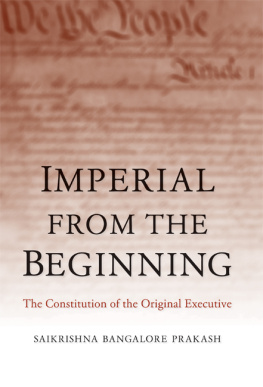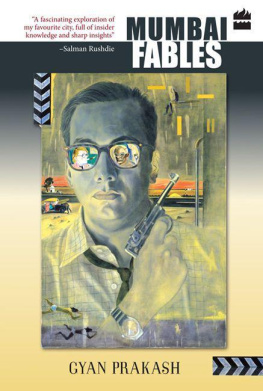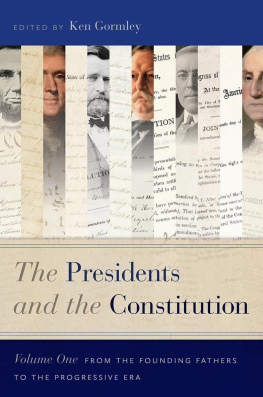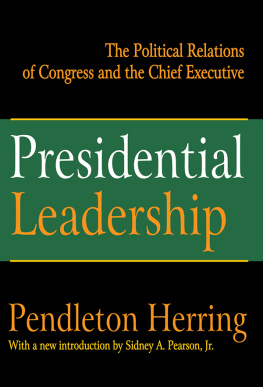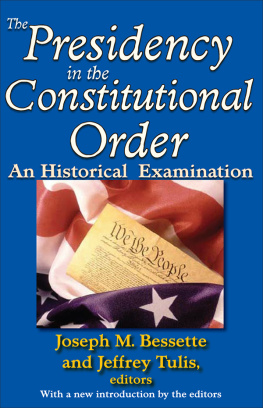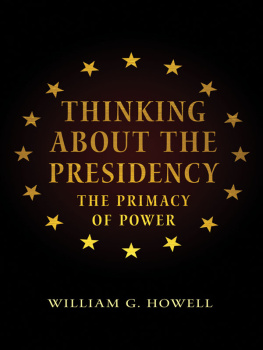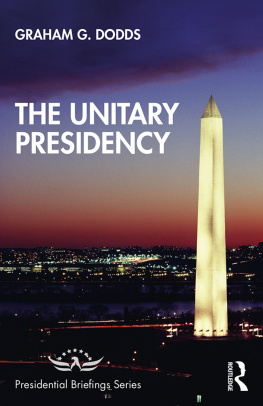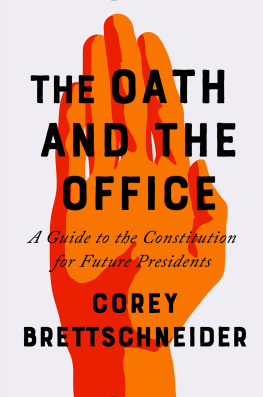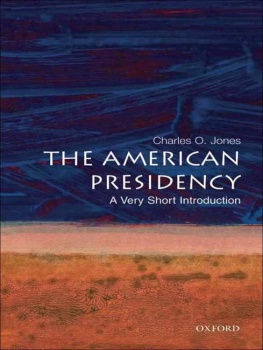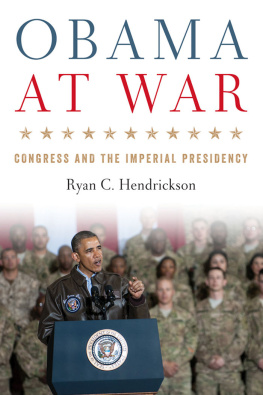

Published with assistance from the foundation established in memory of Amasa Stone Mather of the Class of 1907, Yale College.
Copyright 2015 by Saikrishna Prakash.
All rights reserved.
This book may not be reproduced, in whole or in part, including illustrations, in any form (beyond that copying permitted by Sections 107 and 108 of the U.S. Copyright Law and except by reviewers for the public press), without written permission from the publishers.
Yale University Press books may be purchased in quantity for educational, business, or promotional use. For information, please e-mail (U.K. office).
Set in MT Baskerville and Bulmer types by IDS Infotech Ltd.
Printed in the United States of America.
Library of Congress Cataloging-in-Publication Data
Prakash, Saikrishna Bangalore, author.
Imperial from the beginning: the constitution of the original executive / Saikrishna Bangalore Prakash.
pages cm
Includes bibliographical references and index.
ISBN 9780300194562 (alk. paper)
1. Executive powerUnited StatesHistory18th century. 2. Legislative powerUnited StatesHistory18th century. 3. PresidentsUnited StatesHistory18th century. 4. JudgesUnited StatesHistory18th century. 5. RepublicanismUnited StatesHistory18th century. 6. Political leadershipUnited StatesHistory18th century. 7. Constitutional historyUnited States. 8. United StatesPolitics and governmentHistory18th century. I. Title.
KF5053.P725 2015
342.73'062dc23 2014030083
A catalogue record for this book is available from the British Library.
This paper meets the requirements of ANSI/NISO Z39.481992 (Permanence of Paper).
10 9 8 7 6 5 4 3 2 1
To my parents, B. K. Prakash and Subbalaxmi B. Prakash
CONTENTS

CHAPTER ONE
A King, Under the Title of President
CHAPTER TWO
English Whigs, Cordial in Their Jealousies of Their Executive Magistrate
CHAPTER THREE
Constituting His Highness the President
CHAPTER FOUR
The Executive Power as the Active Principle in All Governments
CHAPTER FIVE
The Constitutional Executor of the Laws
CHAPTER SIX
The Transaction of Business with Foreign Nations Is Executive Altogether
CHAPTER SEVEN
First General and Admiral of the Confederacy
CHAPTER EIGHT
The Executive Power of Appointing, Overseeing, and Controlling Those Who Execute the Laws
CHAPTER NINE
Not a Single Privilege Is Annexed to His Character
CHAPTER TEN
The Combined Authority of Execution and Legislation
CHAPTER ELEVEN
Judges as Shoots from the Executive Stock
CHAPTER TWELVE
Whatever Requisition the President Shall Make and the Federal Duties of State Executives
CHAPTER THIRTEEN
The President as Glorious Protector of the Constitution
ACKNOWLEDGMENTS

I owe thanks to many.
Gratitude to colleagues and mentors who have educated me on the presidency: Larry Alexander, Akhil Amar, Steve Calabresi, Neal Devins, John Harrison, Harold Koh, Gary Lawson, Caleb Nelson, Michael Paulsen, Eric Posner, Michael Ramsey, Michael Rappaport, Steve Smith, Kate Stith, Adrian Vermeule, Steve Walt, and John Yoo.
Thanks to the generous support offered by Deans Daniel Rodriguez and Kevin Cole of the University of San Diego and Paul Mahoney of the University of Virginia. Thanks to Robert George and Bradford Wilson of the James Madison Program at Princeton University for supplying a congenial place to begin writing. Thanks to excellent research support from the wonderful librarians at the University of San Diego and the University of Virginia.
I also owe much to a phalanx of research assistants: Ryan Baasch, Michael Baker, Lucas Beirne, Andrew Bentz, Simon Cataldo, Devin DeBacker, Bernadette Donovan, Andrew Ferguson, Thomas Feiter, Franchesca Fitch, Nicole Frazer, Russel Henderson, Alexander Krueger-Wyman, Carolyn Kuduk, Michael Lough, April Russo, Maria Slater, and Brian Stephan.
Thanks also to Lynn Chu, Glen Hartley, Kip Keller, Phillip King, Jaya Chatterjee and William Frucht for helping me navigate the new (to me) world of book publishing.
Finally, thanks to the patience of my loving wife, Rashmi, and my three girls, Gayathri, Gauri, and Aditi Lakshmi.
Endar Mahnubhvulu. Andarik Vandanamulu.
INTRODUCTION

We live in turbulent times: a sputtering economy, an interminable war, and Kulturkampf over gay marriage and immigration. Hoping to satisfy public expectations for vigorous action, recent presidents have been energetic and ever grasping, recognizing that their legacy rests on how well they navigate the crises that periodically buffet the nation. This continues a pattern of hyperactivity in which chief executives have channeled Abraham Lincoln and Franklin Roosevelt. No modern president wants to be the next James Buchanan, a man who clung to a modest conception of his office while the Union disintegrated around him.
When chief executives emulate Lincoln and Roosevelt, delicate constitutional questions come to the fore. President George W. Bush claimed the right to ignore statutes and asserted that he was the decider on all military matters. His predecessor claimed a power to postpone civil suits brought against him and the power to bomb other nations. The current president seems no less enamored of the idea that the Constitution cedes him vast powers over foreign affairs, the military, and the execution of federal law. In the process, he has forsaken campaign pledges meant to demonstrate that his was a less regal conception of the office, proving once again that a politician's stance on presidential powers often turns on whether he or she occupies the Oval Office.
Has the reach of contemporary presidents exceeded their constitutional grasp? Some who favor the idea of a living Constitution, and believe that practice makes the Constitution, suppose that recent patterns are especially probative. For instance, if recent presidents regularly have settled the foreign claims of American nationals, then this practice establishes the legitimacy of that power, whatever may have been true a hundred or two hundred years ago. For other living constitutionalists, the Constitution is (or should be) whatever generates the best policies, suggesting that whether the executive has particular authority depends on whether we think, all things considered, a president ought to have it. Under this functional approach, the content of the Constitution rests on our refined sense of the optimal allocation of power among the branches.
Notwithstanding the appeal of the living Constitution in other areas, founding conceptions of the presidency remain at the forefront of conversations about the office. Unsurprisingly, scholars favoring the original Constitution apply their methodology (originalism) to Article II. But other scholars, even those dismissive of originalism, nonetheless make claims about the presidency the Founding Fathers constructed. Hence, there is something of a convergence with respect to presidential power and duties: almost everyone supposes that the Constitution's original meaning matters in some unusual way.
Next page
